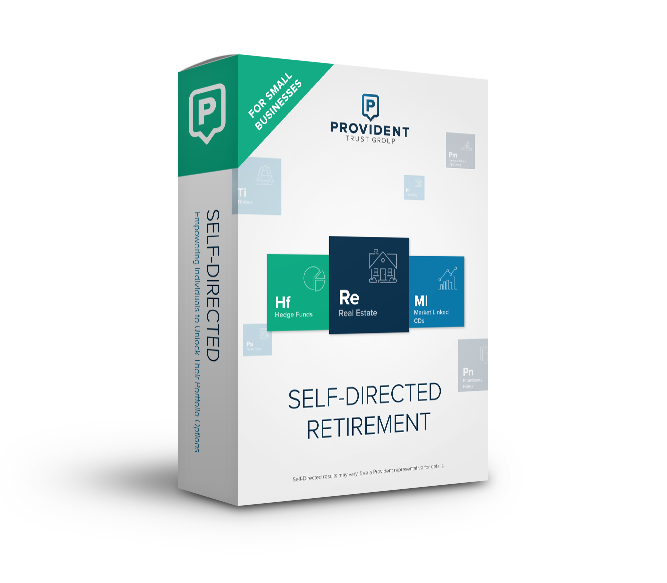Fast. Easy. Secure.
Our online account portal will walk you through the process, step by step.

Simplified Employee Pension Plan (SEP) IRA
A Simplified Employee Pension Plan, or SEP IRA, is a type of employer-sponsored retirement savings plan. It is a great way to increase the amount you and your employees save for retirement.
The SEP IRA is a great option if you are a self-employed individual or small business owner. It allows you to take a potential tax deduction equivalent to the contributions made into the SEP IRA each year. This tax deduction is subject to government guidelines.
The rules governing a SEP plan are not as complicated as a 401(k) plan, and have a few similar benefits. Contributions to a SEP IRA are tax deductible, and earnings within the account are tax deferred until withdrawn, just like a 401(k) plan. This means that the investments’ income in these accounts grows without having to be included in your annual taxable income. Only when the funds are withdrawn from the account as a distribution will there be a potential tax liability.
TAX-DEFERRED
Funds are tax-deferred while in the account, which means that you do not have to pay taxes until the funds or assets are removed from the account.
TAX DEDUCTIONS
Contributions to your SEP IRA may be tax deductible by your business, provided you meet certain requirements.
EMPLOYEE RETENTION
Motivates employee retention by providing your team with additional benefits to assist in saving more for retirement.
LONGER CONTRIBUTION PERIOD
Your employees can continue to receive SEP contributions past age 72, as long as they meet the requirements of the employer’s SEP Plan agreement.
NOTE: Please visit www.irs.gov for a complete breakdown of the rules and regulations concerning SEP Plans. Certain restrictions apply regarding prohibited transactions.
| 2023 | 2022 | |
|---|---|---|
| For Tax Year 2020 | ||
| Employer Contribution Limits | Up to 25% of Compensation ($66,000 Maximum)* |
Up to 25% of Compensation ($61,000 Maximum)* |
*The employer can contribute up to 25% of your compensation up to the maximum limit. Employer contributions may not exceed $66,000 for 2023, raised from $61,000 in 2022. Compensation limits and deductibility apply. Please contact your employer for further information.
This material is provided for general educational and informational purposes only and should not be considered to be legal, tax or investment advice. Provident Trust Group, LLC is a non-discretionary, passive, directed custodian that does not sell or solicit investments and does not provide investment advice or recommendations. Provident Trust Group, LLC is not obligated to review and does not endorse any investment or investment advisor, and individuals are responsible for the investments in their accounts. Consult with a tax and/or financial advisor to determine what may be best for your individual needs.
Frequently Asked Questions
Here are a few of the most frequently asked questions when opening a self-directed account.
How do your fees differ from other custodians who handle traditional & alternative assets?
Provident Trust Group offers a flat-rate annual fee. This differs from many other alternative asset custodians who may increase your annual fee based on an increase in the number of assets you select, value of your assets, or even the purchase of a different asset class.
Most custodians of traditional assets collect fees and/or commissions based off of the amount of trades or recommendations of investment choices. For our full fee schedule, click here.
Can Provident Trust Group provide tax or legal advice regarding your investment?
No. If you should need tax or legal advice regarding your investment, you may engage a specialized tax law firm to provide the needed advice.
What types of investments are prohibited with retirement accounts?
The IRS does not state which investments are permissible in a qualified account or retirement plan, but they do state specific asset classes that are prohibited. The IRS currently prohibits IRAs from investing in Life Insurance, Collectibles and S-Corps. Some examples of collectibles, include:
- Artwork,
- Rugs,
- Antiques,
- Metals – with exceptions for certain kinds of bullion,
- Gems,
- Stamps,
- Coins – (but there are exceptions for certain coins),
- Alcoholic beverages, and
- Certain other tangible personal property.
For more information, click here for the IRS Website.
Can my account invest with other partners, including myself?
Yes, your IRA can invest with other partners and yourself individually. However, it is important to consult legal counsel in these situations to observe formalities and rules that may be associated with that investment.
Not Sure What Plan Is Right For You?
Take a minute or two and compare similar plans that may be the right fit for your needs.
The Provident Advantage
Our approach focuses on delivering clear and concise information so you can make well-informed decisions regarding your investments. Our clients rely on our abilities to ensure every administrative and reporting detail is covered and completed on time.
IRS Required Reporting
Record Keeping
IRA & Qualified Plan Administration
Transfer Processing
Alternative Asset Custody
Rollover Assistance
Self-Directed Education
Contribution Processing
Distribution Processing
Your investment freedom is a click away
 OPEN AN ACCOUNT
OPEN AN ACCOUNT
Our completely electronic application process will have you set up in minutes.
 FUND YOUR ACCOUNT
FUND YOUR ACCOUNT
Transfer or Rollover old or non-performing retirement assets.
 START INVESTING
START INVESTING
Enjoy investment freedom with a truly self-directed retirement account.
Our simple online process makes setup a breeze so you can focus on what matters most – your retirement.
Our 100% web-based process provides easier form completion and clearer view of holdings and transactions that will assist customers in opening new accounts securely and quickly without any physical paperwork. Customers can also complete fund transfers from other custodians, electronically initiate investments, as well as manage multiple accounts with a click of a button.

